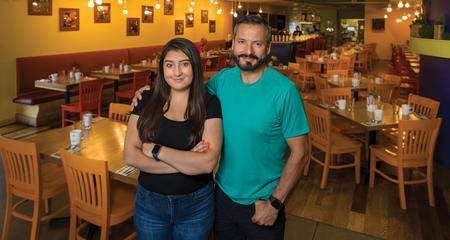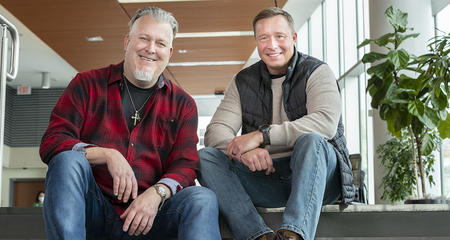
A State of Readiness
After sustaining multiple life-threatening injuries, Nelson Ortega Leon is home with his family and back on his feet.

On May 16, 2016, Nelson Ortega Leon, then 30, worked third shift at a Waukesha foundry, on the line with a molding machine. There was trouble with a machine that night, and Nelson needed to remove a broken mold.
As he wrestled with the heavy mold, Nelson felt something touch his back. Looking over his left shoulder, he realized the equipment was moving. One piece of machinery shoved him forward, squeezing his body tightly against another part of the machine.
His co-workers immediately called 911. “I remember telling them, ‘I can’t breathe, I can’t breathe! Get me out of here!’” Nelson said. After freeing Nelson from the equipment and quickly assessing a host of life-threatening injuries, paramedics drove him to the adult Level 1 Trauma Center at Froedtert Hospital.
When Nelson arrived around 3 a.m., the trauma team was ready. To receive the adult Level 1 Trauma Center designation, a hospital must establish a comprehensive program to treat severely injured patients. This means having trauma surgeons, orthopaedic surgeons and an array of other surgical specialists standing by 24/7.
The fact that Nelson is alive today is a testament to the expertise available at the Trauma Center. He is proof of the compassionate effort the trauma team pours into getting severely injured patients back to their daily lives.
Addressing Grave Injuries
The team rushed Nelson into the operating room, where trauma surgeon Lucia Chou, MD, focused on his chest and abdomen, which were badly crushed in the machine. “He was fading in and out of consciousness and his blood pressure was low,” said trauma surgeon Thomas Carver, MD, FACS. “Our goal was to stop any bleeding and check the injuries in his abdomen.” Nelson’s injuries included fractures in his sternum and spine, damage to his spleen, lungs and small intestine, and a severe de-gloving injury to his back. In a de-gloving injury, the skin and tissue just below it separate from deeper tissue layers, depleting its blood supply.
In the days that followed, Nelson made multiple trips to the operating room, where he was cared for by a team that included Dr. Carver, trauma surgeons David Milia, MD, and Marshall Beckman, MD, along with anesthesiologist Junica Bajic, MD. Nelson faced a roller coaster of health challenges. His muscle injuries were so extensive that his bloodstream became overloaded with protein, causing his kidneys to fail, which meant he needed dialysis. He developed pulmonary (lung) failure and required a ventilator to breathe. Due to a spontaneous perforation in his colon, Dr. Carver performed an ileostomy to reroute his colon outside his body. The severe lacerations on his back also required constant care. “Nelson needed very complex wound management, which we’re adept at because we see so many severely injured people here,” Dr. Carver said.
Compassionate, Multicultural Care
Born in Puerto Rico, Nelson is fluent in Spanish and English. However, he was so sick, he spoke very little at first. His parents, who traveled from Puerto Rico, and his wife, Zuleyka, only speak Spanish. “To make sure Nelson’s family was well-informed about his injuries and prognosis, we made it a priority to arrange translation services,” said Rosemary Wagner, RN, a case manager on the cardiovascular and surgical intensive care units. Wagner’s focus is managing patient care during hospitalization.
Wagner and her colleagues also arranged for Froedtert Hospital’s Child Life Program specialists to be on hand to help Nelson and Zuleyka’s two small boys, then ages two and three. These certified professionals work with children who have a gravely ill or injured parent or adult family member. The specialists educate, prepare and support children while the adult is in the hospital, using activities such as drawing to help kids understand what is happening and reduce their stress and anxiety.

Nelson, and his wife Zuleykas' sons, Ghenniel and Giovaniell
Wagner met with Zuleyka and other family members to learn more about Nelson’s health and daily life before he was injured. Wagner and her care coordination colleagues were thinking about what Nelson would need after leaving the hospital for a rehabilitation program or home. They checked in with him daily.
They also consider a patient’s psychological needs. “We get the trauma psychologist involved as soon as patients can talk,” she said. Patients may decide to meet with Terri deRoon-Cassini, PhD, clinical psychologist, to cope with the intense feelings that come in the aftermath of injuries and treatment.
The Long Road to Recovery
But for Nelson, discharge was a long way off. Dr. Carver recalls that it took nearly a month after Nelson’s arrival for the team of surgeons and other advanced practice providers to feel optimistic about his future. In late June, nearly six weeks after he arrived at Froedtert Hospital, Nelson was released to an acute rehabilitation facility where he remained on a ventilator for a time while receiving care. “He was just so deconditioned from everything that he wasn’t able to breathe on his own,” Dr. Carver said.
Throughout the summer and fall, Nelson made several trips from the long-term care facility to Froedtert Hospital, where he was admitted for problems including an infection related to his ileostomy. Dr. Carver cared for Nelson often in this period and marveled at his optimism and focus. “His goal was to get home for Thanksgiving,” Dr. Carver said. “We made a plan together.” Their plan succeeded, and “it was his first time home in five months,” Dr. Carver added.
A team of physical and occupational therapists, wound-care nurses and other specialists visited Nelson at home in Waukesha to help him continue his progress. He also returned to Froedtert Hospital to visit the wound care clinic. Dr. Carver notes that Nelson’s wife, Zuleyka, deserves credit for her attentive care of her husband. “She did a phenomenal job, and she’s the reason that he was able to stay home,” he said.
Nelson continues to visit Froedtert Hospital for check-ups. Wagner predicts this will continue for many years. “They will need to make sure every organ that was damaged continues to heal,” Wagner said.
He also continues physical therapy three times a week. He struggles with pain in the scar tissue on his back, and walking for long distances is exhausting. Still, his ultimate goal is to someday return to work. Given his amazing progress over the last year, Dr. Carver thinks Nelson will be able to do it.
Nelson said his family provided the motivation. “My family kept me alive. I can’t leave my kids alone in this world without a parent,” Nelson said.
He is grateful to the Froedtert & MCW trauma team. “They don’t stop until you’re okay, you’re breathing, you’re alive,” Nelson said. “They do an amazing job.”
Dr. Carver noted that the adult Level 1 Trauma Center at Froedtert Hospital was the best-equipped to get Nelson back on his feet.
“I know that there is only one place to go for care,” Nelson said. “Froedtert Hospital.”


